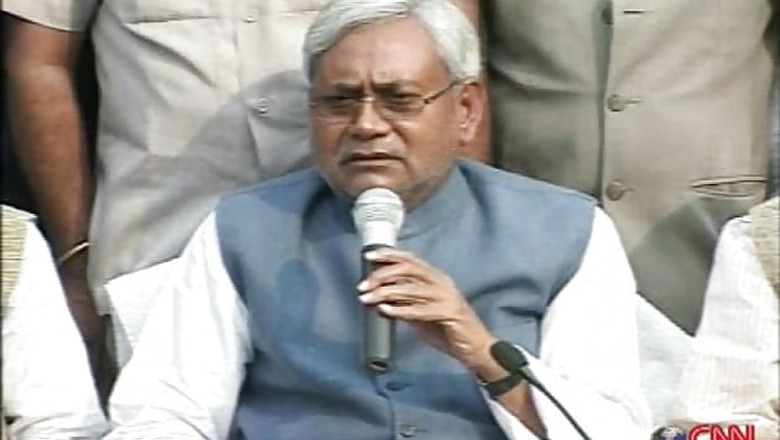
views
Patna: Bihar Chief Minister Nitish Kumar has charged the Centre with allowing foreign direct investments (FDI) in multi-brand retail under foreign pressure. Claiming that the FDI in retail would be of no economic significance, Kumar said that the "aam admi" (common man) will suffer due to this policy.
"It was clear that they (foreign media and companies) were putting pressure on the Prime Minister (Manmohan Singh) by calling him underachiever and see here we have this decision," said the Bihar Chief Minister.
Saying that he was in favour of FDI in infrastructure, Kumar added that he would not allow the policy in Bihar as farmers would not reap any benefit if it was implemented in the agricultural sector.
"If FDI comes in infrastructure etc., it's okay. Not in agriculture. They want our markets. Shiny markets won't help farmer. We won’t allow this in Bihar. Those who are supporting this government on FDI issue and holding up the government will be responsible for their actions," he said.
Kumar also ruled put mid-term elections, saying that the UPA will survive the rest of its term. "I don't think elections will happen before 2014. UPA will do some jugaad. They will get their allies together," he added.
In one of the boldest decision taken by Prime Minister Manmohan Singh in UPA-II, the government bet big on crucial reforms brought a big cheer from industry even though the move also put the government in troubled water politically with the Opposition and some key allies voicing strong differences.
At the meeting of the Cabinet Committee on Economic Affairs (CCEA), the government on Friday cleared FDI in multi-brand retail, single-brand retail, aviation, broadcasting and power exchanges.
In multi-brand retail, an issue that has been troubling the government for quite some time, the Cabinet decided to allow 51 per cent foreign direct investment. However, unlike the last time, the government has let individual states decide whether to allow it or not.
The Cabinet also approved the proposal of the Department of Industrial Policy and Promotion for amendment of the existing policy on FDI in single-brand product retail trading. The government permitted FDI, up to 100 per cent, in single brand product retail trading, subject to specified conditions.
Relaxing the norm in single-brand retail where FDI is above 51 per cent, the government said that while 30 per cent of the sourcing would have to be done from Indian companies, they may not be from medium and small scale, village or cottage industry. However, it said that it should preferably be done from them.
Notably, it was earlier mandatory in case of FDI over 51 per cent that 30 per cent sourcing should be done from small and medium scale, village and cottage industry.
In another major decision, the government approved FDI in aviation, allowing up to 49 per cent investment. The decision means that foreign airlines will now be allowed to invest as much as 49 per cent in the Indian carriers. However, this won’t be automatic as the companies will have to get clearance from the ministry and FIPB.
Also, according to 1937 aircraft rules, as many as three-fourth of the directors need to be Indian and the Chairman also has to be Indian. India has to hold substantial amount of investment in that airline.
The government, in a move to liberalise the broadcast sector, decided to raise FDI cap to 74 per cent in various services of the sector, except the TV news channels and FM radio where the cap of 26 per cent would apply.
The decision of the CCEA will apply to broadcast carriage services providers, including Direct-to-Home, Head-end in the Sky (HITS), Multi-Service Operators (MSOs) and cable TV to bring about uniformity.
Till now, 49 per cent FDI was allowed in cable TV and DTH while it is 74 per cent in HITS, which is a satellite multiplex service that provides TV channels for cable operations.
Among other segments, 74 per cent FDI was allowed in Mobile TV, which is an area of future growth. However, for TV news channels, current affairs, FM radio and content providers, the FDI limit will stay at 26 per cent.
In another important decision, the government approved the disinvestment of five Public Sector Units (PSUs), including Oil India (10 per cent), Nalco (12.5 per cent) and Hindustan Copper (9.59 per cent).




















Comments
0 comment